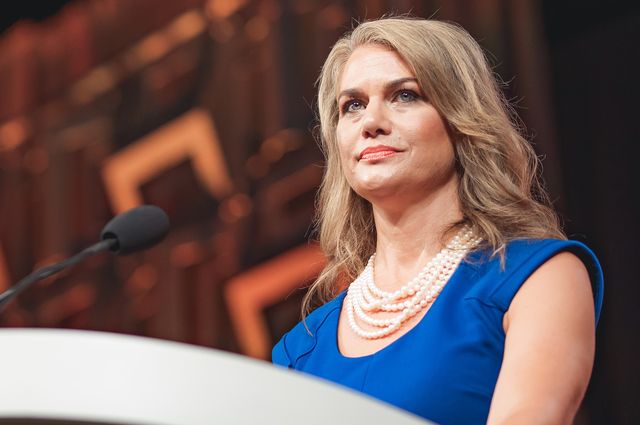UCLA Health nurses have earned many notable achievements through the years.
Now, another major accomplishment can be added to the list. Melissa Reider-Demer, a nurse practitioner, was recently named national Nurse of the Year by Press Ganey, a Boston-based health care organization that promotes clinical safety, patient experience and workforce engagement.
In past years, UCLA nurses have been recognized for other awards, including Magnet Status and the National Patient Safety Foundation and the DAISY Foundation Team Award for Extraordinary Nurses.
The Press Ganey award honors a nurse who demonstrates commitment to care innovation, transformation, and collaboration. Reider-Demer, who holds a doctorate in nursing practice and specializes in neurology at UCLA, was recognized for her work to improve the patient experience and contributions to her organization.
In an interview, Reider-Demer shares what it means to win the award, how she got into neurology and career advice for new nurses.
What was your reaction to winning Nurse of the Year?
Honestly, I was surprised, shocked and grateful. For years, I have pioneered and championed many initiatives but was never certain if these efforts were fully embraced or understood. I am so grateful to my boss, Dr. Thomas Carmichael, the chair of the UCLA Department of Neurology, who not only believes in me but also took the time to nominate me. I will never forget this for rest of my career!
What has been your role in improving the patient experience, which this award recognizes?
From day one of being a nurse, I have always gone to bat for my patients by making sure they get the best providers, the most accurate information, and the best access possible. I also try to approach each of my patients the same way I would want to be treated.
Improving patient care actually means making sure that patients can access health care and are informed along the way. There must be consensus among patients, their families, and their providers about the plan of care, a clear set of expectations and measurable outcomes.
Eventually in my career, I started dissecting system issues and exploring obstacles inhibiting patient care. I strived to make changes that would improve not only my specific department but benefit other departments, too. For example, I created and piloted programs that decreased emergency room admissions, decreased length of hospital stays, and accelerated the start of rehabilitation for patients after traumatic events.
What role does teamwork play in caring for patients?
Transitioning patients from inpatient to outpatient status and looping back to the patient’s primary provider requires teamwork. My role has allowed me to connect the gaps in patient care and help complete the full circle of care. Identifying gaps and creating a plan to fill them requires teamwork, including for implementation and maintenance. I could never successfully complete my work without the ongoing support of my teams across the board.
How did you choose neurology as your area of focus?
This focus started after I married a man who has two sons with autism. I am formally trained in gastroenterology, but after becoming a stepmother, I switched to neurology because I wanted to understand more about brain disorders and how to improve the lives of these patients. I enjoy challenges that prompt me to seek an answer or make sense of what is occurring in the patient. I feel that if you are you constantly challenged by your work and enjoy the process of exploring, then you will do well. Neurology provides this for me.
What career advice would you give to new nurses?
Embrace the power you have in your role as an advocate for patients and families. Nurses also need to work together to educate those around us about our roles. I helped pioneer the new Doctorate Nurse Practitioner program and was among the few that obtained a DNP degree, leading a pathway for others. Now, years later, the UCLA School of Nursing launched their own DNP program in 2018. We should be proud of this new high-level nursing degree that provides more education and opens the doors to greater opportunities.
What keeps you going? What excites you about your job?
I get my energy from the never-ending challenge of solving a mystery, improving a complex patient care situation, or creating new ways to improve care and access. Every day someone expresses gratitude for my work, and that makes me work harder!





